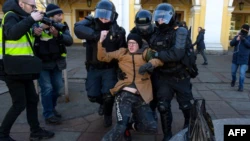Theater director Mikhail Durnenkov and actor Aleksey Yudnikov are both longstanding enemies of the Kremlin.
For decades, their performances have parodied the Russian government and its leader, President Vladimir Putin, testing the boundaries of expressive freedom under constant state surveillance.
Durnenkov’s 2015 production, The War Has Not Yet Started, has proven eerily prescient: a tense play of 12 intertwined stories about life in modern Russia amid the undeclared war with Ukraine and endless state propaganda.
Despite regular run-ins with the police and authorities, the Moscow-based Teatr.doc company managed to keep going. But, following a severe clampdown on political opposition and civil society in Russia following its invasion of Ukraine, Durnenkov and Yudnikov are among many artists who have fled the country.
They have found temporary shelter at a haven run by the organization Artists at Risk in Finland’s capital, Helsinki.
“We left the country simply so as not to be on the side that is waging war, so as not to cast our votes in this way. If I’m here [in Finland] that means I can speak, I must speak and I must help the protest voices from Russia to be heard, because in Russia it is impossible,” Durnenkov told VOA.
Anti-war protests in Russia have been forcefully suppressed, with thousands of demonstrators arrested. A new law imposes jail terms of up to 15 years for spreading what the Kremlin calls ‘fake’ news about the invasion or the Russian military.
Durnenkov said the space for freedom of expression has all but disappeared.
“Any statement now in this space is regarded as a betrayal in the war. That is to say, it is literally breaking the law. Then there is an unspoken law that exists now in Russian society, whereby if you are a country at war and if you say something [against it], you are selling out your country at the frontline, and this will be punished instantly, severely, that very second,” he said.
Durnenkov said he will return as soon as it is safe to do so.
“Of course, being a playwright who writes in Russian means being a part of that country. And if I feel that there is an opportunity to influence something, to change something, then I would like to return,” he said.
His friend and colleague, Kyiv-born actor Aleksey Yudnikov, also fled Moscow following the invasion, leaving his family behind.
“I am in a situation where I can’t communicate with my friends and I can’t see my children because I left Russia,” Yudnikov told VOA.
“Some I can’t see because they’re far away, and some I can’t see or hear because they are in another sense far away from me, in their acceptance of [Russia’s] aggression,” he said.
“I feel pain and personal guilt. What could I alone change? I couldn’t find any better option than just leaving. It was spontaneous, an instinctive gesture to leave – but also to try again here [in Finland]. Simply because here, outside of Russia, you can tell the truth,” Yudnikov told VOA.
In April, Yudnikov staged a protest outside the closed Russian pavilion at the Venice Biennale art festival in Italy. He was arrested but released without charge.
The 48-year-old actor said the invasion of Ukraine has unleashed a parallel war within Russia.
“The henchmen of this regime are absolutely shamelessly trying to impose this formula – that Putin is Russia, and that these things that do not exist without each other,” he said.
He added: “This is a war between reality and escape, a total escape from this reality. If you like, it is a war between something real and something fake.”
Mari-Leena Kuosa contributed to this article.

